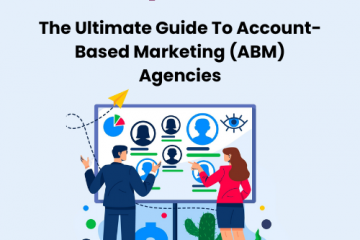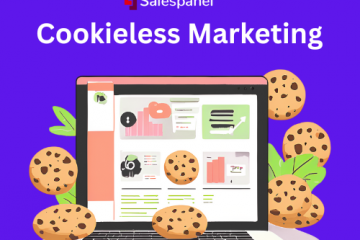Guide to Privacy-Focused Analytics & Best Tools
The most significant websites on the internet use Google Analytics. According to BuiltWith, 28 million websites are using Google Analytics. Furthermore, around 74% of the most popular websites used this tool as of April 2022.
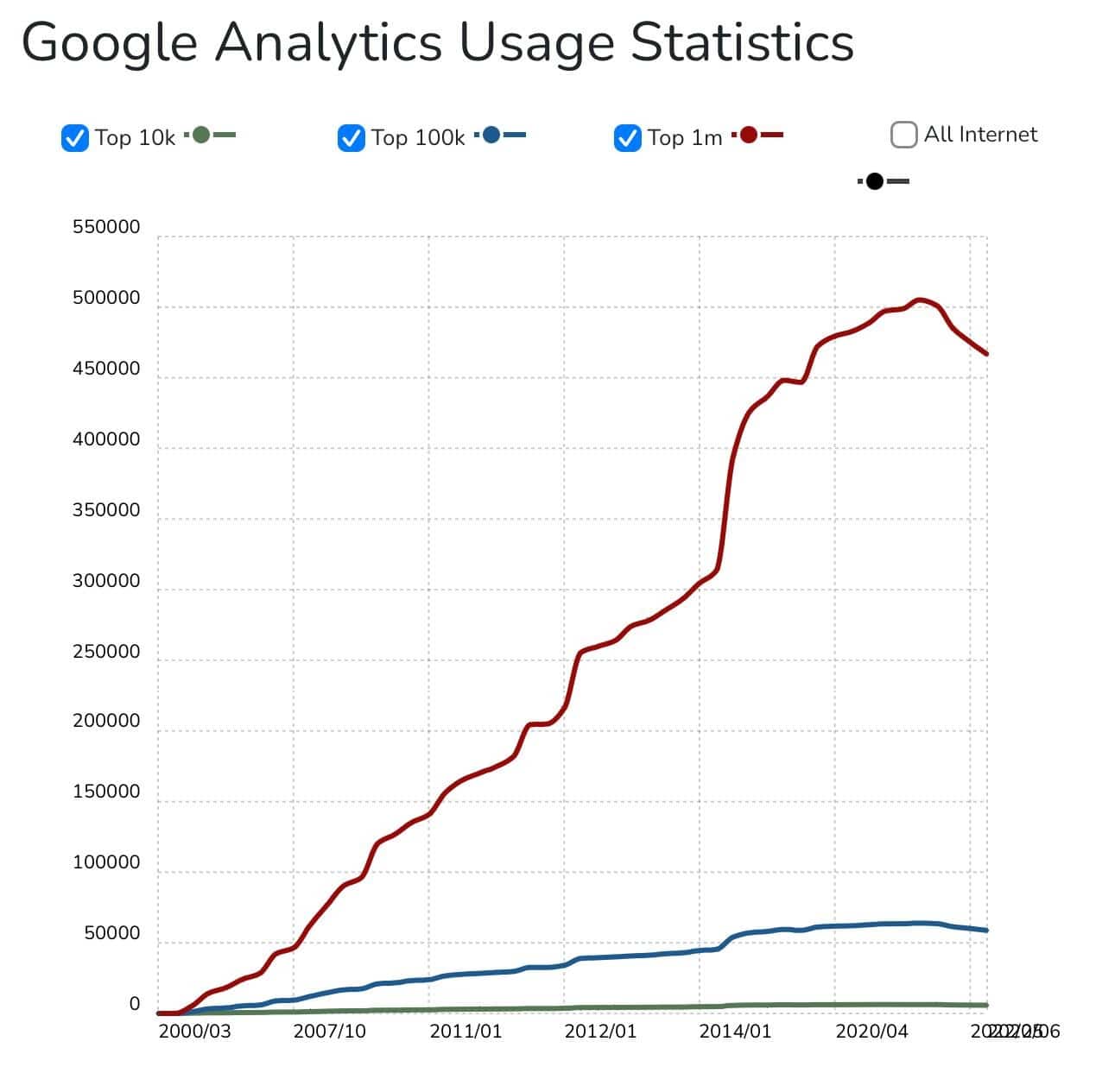
Source: Builtwith
But the industry is going through a significant shift. Google is sunsetting Universal Analytics and moving to Google Analytics 4 without a proper data migration option. On top of that, EU nations like Italy and France are declaring Google Analytics an illegal product. Plus, major players like Apple are getting serious about their users’ data safety. A survey claims that 74% of internet users in the USA are more worried about online privacy than ever before.
Thus, while GA is still the biggest player in web analytics, companies have started to look for alternatives. EU doesn’t like Google Analytics and even with GA4, Google is struggling to be compliant. You can read our Google Analytics article where we have discussed this in detail!
A need for privacy-focused analytics tools has emerged and this will be the focus of our article today.
Why Do You Need to Focus on Privacy Analytics?
Google Analytics is a free tool for web analytics This software tracks around 85.6% of website traffic. But, to obtain high-quality analytical data, you are forced to compromise on privacy. Google Analytics is free because the data collected about your customers, from your website, helps Google make money. Google generates revenue from the data that your website visitors leave behind. This is why Google offers many free services like email, maps, and more.
If you are concerned about compliance and privacy, you have to consider moving away from Google Analytics. Google uses your data to fuel its advertising network. And, many legal authorities have declared targeted advertising a risk. These ads manipulate viewers’ behavior and convince them to do certain things.
Let’s have a look at a few other reasons why switching to a privacy analytics solution
GDPR Privacy Compliance
The General Data Protection Regulation is a legal framework for data protection in the European Union. If you want to track European visitors on your website, meeting all the GDPR privacy rules is important.
This law is designed to provide more control to users over their digital data. In addition, it is a strong action against companies that use fabricated information to mislead customers.
Considering the strict GDPR terms, Google has changed some privacy settings with Google Analytics 4. But unfortunately, GA 4 is still not struggling with compliance as we mentioned before.
So, to target European markets, you are better off with a privacy analytics solution.
Ruling Against Google Analytics
Regulatory concerns are unavoidable with Google Analytics. First, Austria, France, and Italy have declared Google Analytics illegal. Google Analytics and Google’s advertising network were not designed with stringent privacy mechanisms in mind. Some regulators believe that GA has no reliable consent framework.
However, Google is taking some initiatives to become a secure platform. For example, Google created Funding Choices, a platform for large publishers that monetize data inventory using Google products. This platform was IAB-approved under TCF (Transparency and Consent Framework) and GDPR. But, the Belgian Data Protection Authority and the Irish Council for Civil Liberties have declared the Google consent platform non-GDPR compliant. That is because it conflicts with an individual’s privacy rights.
Complex Learning Curve
Google Analytics is not a simple tool. You need to be a professional with the tool to get value from it. On the other hand, privacy-focused analytics are simpler and are focused on the website owners’ needs. It includes data components, such like:
- Unique visitors
- Referrals
- Page views
- Landing pages, etc.
- And, more… (Spoiler: With Salespanel :D)
The best thing about collecting less data is that it gets easier to manage and interpret. It can help website owners make accurate and fast decisions. The data is also presentable and can be analyzed and shared quickly.
Better Reach
Many browsers and plugins today block Google Analytics. So, while using GA, you can miss 42.7% of the traffic using ad blockers.
Furthermore, privacy regulations in the United Kingdom and the European Union explicitly state that analytics cookies cannot be set before a user opts in.
Therefore, if cookie banners are correctly implemented and do not use deceptive design patterns, user visits will not be recorded until the user accepts the Google Analytics cookie. This further reduces the percentage of data collected.
Ad-blockers do not tend to block privacy-focused analytics, giving site owners a much better indication of how all visitors use their site.
Control Over Raw Data
Google Analytics lets you have no access to raw data. It only shows you aggregated data summarized in a report. This can limit your reach. For example, you might get access to more irrelevant data than the data that can help improve your user experience.
Besides this, you also need a tool to visualize your raw data. For example, tools like Microsoft Power BI and Sisense help to clean and visualize data. Limited data provided by many privacy analytics tools make it manageable and provide better insights.
Trust Building
Modern internet users are well aware. They know what GDPR is and how Google is making billions by selling its data to advertisers.
Thus, when users get that “Accept or Reject Cookies” option, they immediately hit the reject option. And websites with persistent tracking messages might lose their potential customers.
According to a report, only 25% of iOS users allow app tracking for a better user experience. Thus, you can show visitors that you care about their privacy and build a solid relationship with them using privacy analytics.
Best Privacy Analytics Tools
There are many privacy-focused analytics tools in the market that help you with GDPR compliance, user privacy protection, and are easy to use. Here are the best options to collect user data online.
Salespanel
Salespanel is the best GA 4 alternative for B2B businesses with GDPR compliance. It helps to track customer journeys and provides a wide range of B2B analytical data.
Unlike traditional analytical tools, Salespanel connects you with customer data that actually matters to your business and actually connects the data to individual customers instead of providing you with holistic analytical data. This is perfect for B2B businesses and helps them in lead scoring, personalize marketing campaigns (B2B users love seeing this!), and automate workflows.
Salespanel only collects first-party data and doesn’t monetize data. The tracking feature only activates when your cookie manager gets consent. Read about it in our documentation. Salespanel doesn’t use your data, it doesn’t use third-party cookies, and it is not bound by the CLOUD act. So, Salespanel plays well with GDPR!
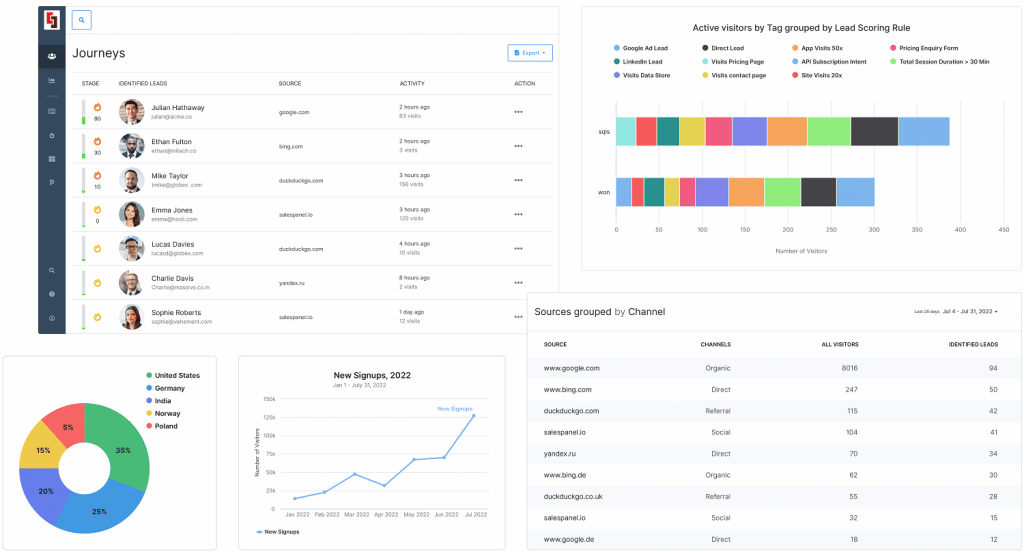
Plausible Analytics
Plausible Analytics is the best tool to replace Universal Analytics. It is a specific active analytics product that delivers the analytical data you require with minimal effort. The product is extremely light, and nothing fishy is happening behind the scenes.
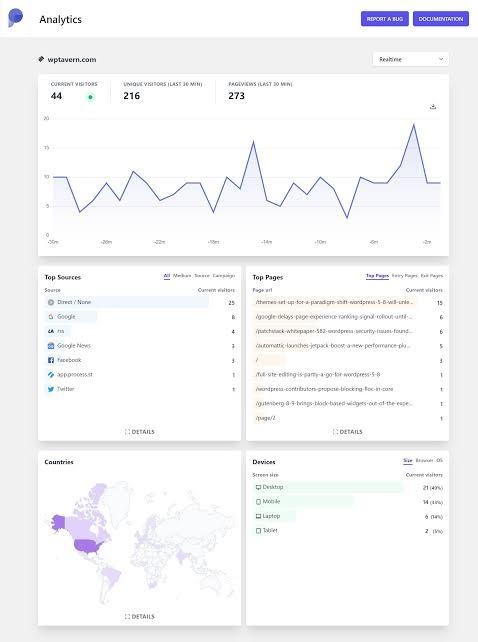
Source: Wptavern
Plausible does not store your data and does not use cookies. Therefore, your data remains entirely under your control, and the company and its servers are based in Europe.
However, there is one minor issue. Plausible gathers IP addresses anonymously using ‘IP hashes.’ While this is far superior to simply storing IP addresses, you can combine it with other data points to identify a user. This can get iffy when it comes to regulations..
Also, it is not suitable for B2B marketing. It doesn’t store cookies and therefore, is not able to tell when a visitor returns to your website. But, at the same time, this enables the product to work without cookies.
Matomo
Matomo is a leading website analytics platform. It’s an open-source tool that offers web and mobile analytics. In addition, it offers user behavior features like heatmaps, session recordings, and form analytics.
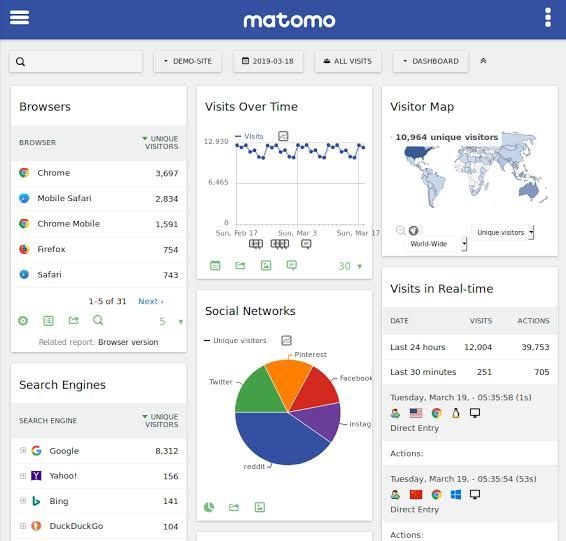
Source: Matomo
Matomo adheres to data privacy policies and provides its users with complete data ownership. In addition, it enables website owners to quickly become GDPR compliant by providing easy access to in-app documentation and information.
Matomo dashboard settings allow you to anonymize IP addresses and geolocation and delete data history when necessary.
Fathom
Fathom is yet another GDPR, PECR, and CCPA-compliant analytics platform. If you use this tool, you won’t need to add a cookie notice to your website because Fathom doesn’t create a digital inventory or track visitors’ habits or browsing history.
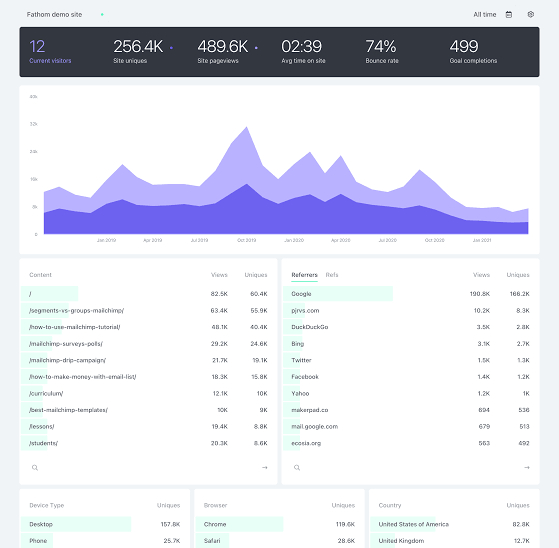
Source: Fathom
Fathom is a tool designed for beginners who do not require detailed website statistics. It does not provide behavioral analytics, only basic web statistics, and treats each visitor as a unique visitor because it does not store any personal data.
Etracker
Etracker is primarily concerned with web analytics and push notifications. It has plugins for several popular website builders, including TYPO3, WordPress, Magento, and Shopware.
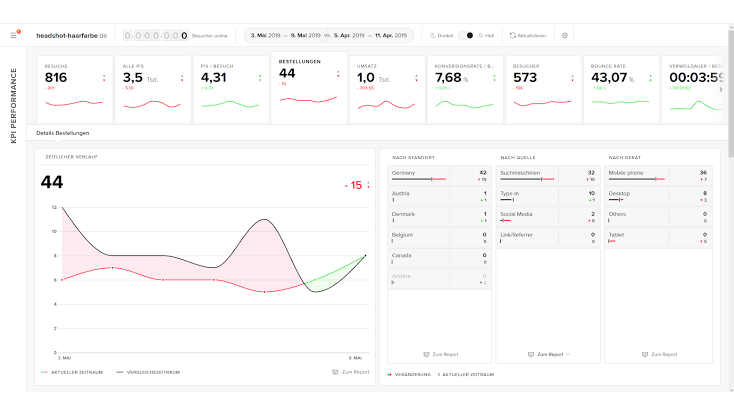
Source: WordPress.org
Etracker Analytics provides basic website data (visitors, conversion rates, bounce rates, and referrers) and analytics with cookieless tracking.
The documentation on their website may appear difficult to follow at the first glance, but overall, this tool is very privacy-focused. If you are willing to learn, it is a great tool.
Let’s Switch to Privacy Analytics Now!
Are you still using Google Analytics? Then, definitely there are many focused options available and it’s probably the best time to look for a switch
To save a few bucks, you can reduce your website reach and get in trouble with online tracking authorities.
Thus, it is high time to use privacy analytics to become GDPR-compliant and build healthy relationships with your customers.
As you can see, there are many nice privacy-focused analytics tools available. So, use them and grow your business beyond limits.
Sell more, understand your customers’ journey for free!
Sales and Marketing teams spend millions of dollars to bring visitors to your website. But do you track your customer’s journey? Do you know who buys and why?
Around 8% of your website traffic will sign up on your lead forms. What happens to the other 92% of your traffic? Can you identify your visiting accounts? Can you engage and retarget your qualified visitors even if they are not identified?
